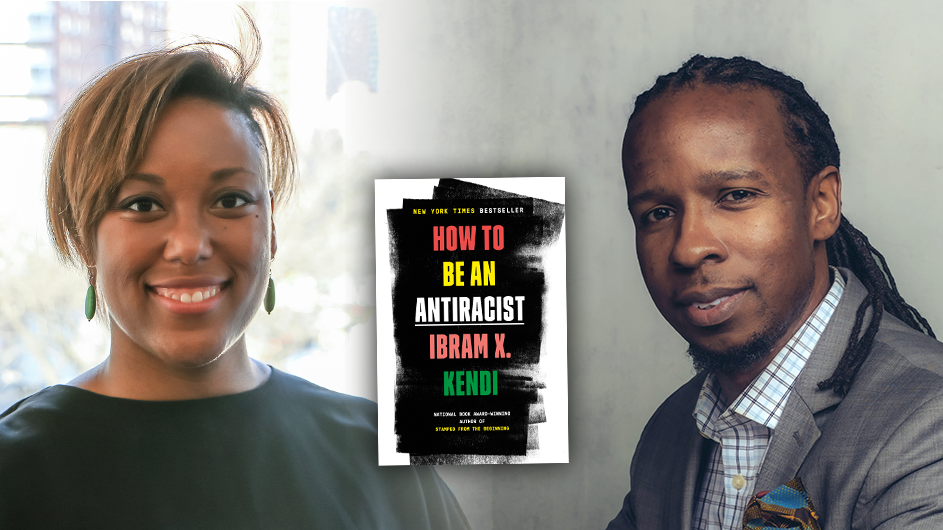Let's Talk About Antiracism With Ibram X. Kendi
Columbia School of Social Work’s Courtney Cogburn spoke with the author about his book, what it means to be antiracist, and the role of universities in helping to combat racism.

Columbia School of Social Work (CSSW) hosted author and academic, Dr. Ibram X. Kendi, for a conversation with Dr. Courtney Cogburn, associate professor at CSSW, on October 5 before a packed crowd of more than 1,500 attendees at the webinar. The event was co-sponsored by the Office of the Vice Provost for Faculty Advancement, the Institute for Research in African American Studies, the Center for the Study of Ethnicity and Race, the African American and African Diaspora Studies Department, and the Office of University Life.
Kendi is the Andrew W. Mellon Professor in the Humanities at Boston University, a best-selling author, and a National Book Award winner. He is also the director of the Boston University Center for Antiracist Research. His book, How to Be an Antiracist, has sparked a nationwide conversation and movement on how to fight systemic racism.
School of Social Work Dean Melissa Begg welcomed the speakers and the attendees to the event. Begg spoke of the importance of engaging in this dialogue around the work of antiracism.
“This exchange will focus on how we can take steps to create a more just society,” she said. “One that is less riddled by the scars and ongoing damage being wrought by anti-Black racism.”
President Lee C. Bollinger introduced the speakers and the importance of Kendi’s work.
“This book and Dr. Kendi’s other writings have become something of a social and cultural phenomenon in recent months, striking a chord, and gaining an exceptionally wide audience of readers who have been prompted by events to rethink their own attitudes and behaviors," he said.
On Joy and Hope
Cogburn led off the conversation by asking Kendi how he cultivates joy. “I know that historically it has been these types of years and these types of times, and even this level of divisiveness and this level of struggle that has led to a sort of radical transformation of this country. And so I’m almost sort of joyful, and I’m hoping to see that there’s going to be light at the end of the tunnel," he said.
A Memoir as a Guide to Being Antiracist
In How to Be An Antiracist, Kendi used his personal story to explain how we all need to work on becoming antiracist. “Ultimately, I wanted to convey the heartbeat of being antiracist is really going on this journey, on this journey of self-reflection, on this journey of self-criticism, on this journey of being taught by others, or certainly taught by experience, taught by books. Part of it is in contrast to standing still, claiming you’re perfectly not racist,” he said. "I felt I had to really show someone who was going on that journey. And I decided to show myself."
The Role of the University
Noting that Kendi is an academic, Cogburn asked, “What is the role of the university in the fight against racism?”
“I think the role of the university could be to support what we call antiracist research," he said. "And so by contrast to racist research, which the university has historically supported, which essentially examines racial inequity and asks the questions, ‘Well, what’s wrong with those people? What’s wrong with those Native people, those Black people, those Latinx people? What’s superior about those white people?’”
Antiracist research, he continued, asks, "what’s wrong with systems? What’s wrong with structures? What’s wrong with policies, power, conditions, and practices?"
Dennis Mitchell, Vice Provost for Faculty Advancement, spoke after Kendi and Cogburn ended their conversation. Mitchell said that he viewed Kendi’s comments on the university’s role in fighting racism as a “call to action” and he asked everyone watching to “not lose our momentum in this work as we forge our way forward.”
Dean Begg closed the event with a quote from poet Jericho Brown. “Only the creative mind can make use of hope. Only a creative people can wield it.” Begg ended by saying, “Let’s keep wielding it.”